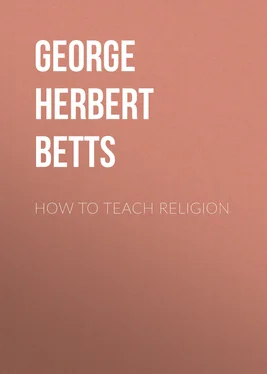George Herbert Betts - How to Teach Religion
Здесь есть возможность читать онлайн «George Herbert Betts - How to Teach Religion» — ознакомительный отрывок электронной книги совершенно бесплатно, а после прочтения отрывка купить полную версию. В некоторых случаях можно слушать аудио, скачать через торрент в формате fb2 и присутствует краткое содержание. Жанр: foreign_prose, Религиозная литература, foreign_religion, foreign_edu, foreign_antique, на английском языке. Описание произведения, (предисловие) а так же отзывы посетителей доступны на портале библиотеки ЛибКат.
- Название:How to Teach Religion
- Автор:
- Жанр:
- Год:неизвестен
- ISBN:нет данных
- Рейтинг книги:5 / 5. Голосов: 1
-
Избранное:Добавить в избранное
- Отзывы:
-
Ваша оценка:
- 100
- 1
- 2
- 3
- 4
- 5
How to Teach Religion: краткое содержание, описание и аннотация
Предлагаем к чтению аннотацию, описание, краткое содержание или предисловие (зависит от того, что написал сам автор книги «How to Teach Religion»). Если вы не нашли необходимую информацию о книге — напишите в комментариях, мы постараемся отыскать её.
How to Teach Religion — читать онлайн ознакомительный отрывок
Ниже представлен текст книги, разбитый по страницам. Система сохранения места последней прочитанной страницы, позволяет с удобством читать онлайн бесплатно книгу «How to Teach Religion», без необходимости каждый раз заново искать на чём Вы остановились. Поставьте закладку, и сможете в любой момент перейти на страницу, на которой закончили чтение.
Интервал:
Закладка:
Childhood's capacity for growth.—Nor must we ever think that because the child is young, his brain unripe, and his experience and wisdom lacking, our responsibility is the less. For the child's earliest impressions are the most lasting, and the earliest influences that act upon his life are the most powerful in determining its outcome. Remember that the babe, starting at birth with nothing, has in a few years learned speech, become acquainted with much of his immediate world, formed many habits which will follow him through life, and established the beginnings of permanent character and disposition. Remember the indelible impression of the bedside prayers of your mother, of the earliest words of counsel of your father, of the influence of a loved teacher, and then know that other children are to-day receiving their impressions from us, their parents and teachers.
Consider for a moment the child as he comes to us for instruction. We no longer insist with the older theologies that he is completely under the curse of "original sin," nor do we believe with certain sentimentalists that he comes "trailing clouds of glory." We believe that he has infinite capacities for good, and equally infinite capacities for evil, either of which may be developed. We know that at the beginning the child is sinless, pure of heart, his life undefiled. To know this is enough to show us our part. This is to lead the child aright until he is old enough to follow the right path of his own accord, to ground him in the motives and habits that tend to right living, and so to turn his mind, heart, and will to God that his whole being seeks accord with the Infinite.
Religious conservation.—If our leading of the child is wise, and his response is ready, there will be no falling away from a normal Christian life and a growing consciousness of God. This does not mean that the child will never do wrong, nor commit sin. It does not mean that the youth will not, when the age of choice has come, make a personal decision for Christ and consecrate his life anew to Christ's service. It means, rather, that the whole attitude of mind, and the complete trend of life of the child will be religious. It means that the original purity of innocence will grow into a conscious and joyful acceptance of the Christ-standard. It means that the child need never know a time when he is not within the Kingdom, and growing to fuller stature therein. It means that we should set our aim at conservation instead of reclamation as the end of our religious training.
Yet what a proportion of the energy of the church is to-day required for the reclaiming of those who should never have been allowed to go astray! Evangelistic campaigns, much of the preaching, "personal work," Salvation Army programs, and many other agencies are of necessity organized for the reclaiming of men and women who but yesterday were children in our homes and church schools, and plastic to our training. What a tragic waste of energy!—and then those who never return! Should we not be able more successfully to carry out the Master's injunction, " Feed my lambs "?
The child-Christian.—All of these considerations point to the inevitable conclusion that the child is the great objective of our teaching. Indeed, the child ought to be the objective of the work of the whole church. The saving of its children from wandering outside the fold is the supreme duty and the strategic opportunity of the church, standing out above all other claims whatever. We are in some danger of forgetting that when Jesus wanted to show his disciples the standard of an ideal Christian he "took a child and set him in the midst of them." We do not always realize that to keep a child a Christian is much more important than to reclaim him after he has been allowed to get outside the fold.
The recent report of a series of special religious meetings states that there were a certain number of conversions " exclusive of children ," the implication being that the really important results were in the decisions of the adults. The same point of view was revealed when a church official remarked after the reception of a large group of new members, "It was an inspiring sight, except that there were so few adults!" When shall we learn that if we do our duty by the children there will be fewer adults left outside for the church to receive?
The teacher must first of all take his stand with the child. He must not allow his attention and enthusiasms to become centered on the matter he teaches. He must not be satisfied when he has succeeded in getting a certain fact lodged in the minds of his pupils. He must first, last, and all the time look upon subject matter, no matter how beautiful and true it may be, as a means to an end. The end sought is certain desired changes in the life, thought, and experience of the child. There are hosts of teachers who can teach grammar (or the Bible), but comparatively few who can teach John .
This does not mean that the material we teach is unimportant, nor that we can fulfill our duty as teachers without the use of interesting, fruitful, and inspiring subject matter. It does not mean that we are not to love the subject we teach, and feel our heart thrill in response to its beauty and truth.
Making subject matter a means instead of an end.—One who is not filled with enthusiasm for a subject has no moral right to attempt to teach it, for the process will be dead and lifeless, failing to kindle the fires of response in his pupils and lacking in vital results. But the true teacher never loves a body of subject matter for its own sake; he loves it for what through it he can accomplish in the lives of those he teaches.
As a student , searching for the hidden meanings and thrilling at the unfolding beauties of some field of truth which we are investigating, we may love the thing we study for its own sake; and who of us does not feel in that way toward sections of our Bible, a poem, the record of noble lives, or the perfection of some bit of scientific truth? But when we face about and become the teacher , when our purpose is not our own learning but the teaching of another, then our attitude must change. We will then love our cherished body of material not less, but differently. We will now care for the thing we teach as an artisan cares for his familiar instruments or the artist cares for his brush—we will prize it as the means through which we shall attain a desired end.
Subject matter always subordinate to life.—It will help us to understand the significance of this fundamental principle if we pause to realize that all the matter we teach our children had its origin in human experience; it was first a part of human life. Our scientific discoveries have come out of the pressure of necessities that nature has put upon us, and what we now put into our textbooks first was lived by men and women in the midst of the day's activities. The deep thoughts, the beautiful sentiments, and the high aspirations expressed in our literature first existed and found expression in the lives of people. The cherished truths of our Bible and its laws for our spiritual development appeal to our hearts just because they have arisen from the lives of countless thousands, and so have the reality of living experience.
There is, therefore, no abstract truth for truth's sake. Just as all our culture material—our science, our literature, our body of religious truth—had its rise out of the experience of men engaged in the great business of living, so all this material must go back to life for its meaning and significance. The science we teach in our schools attains its end, not when it is learned as a group of facts, but when it has been set at work by those who learn it to the end that they live better, happier, and more fruitful lives. The literature we offer our children has fulfilled its purpose, not when they have studied the mechanism of its structure, read its pages, or committed to memory its lines, but when its glowing ideals and high aspirations have been realized in the lives of those who learn it.
Читать дальшеИнтервал:
Закладка:
Похожие книги на «How to Teach Religion»
Представляем Вашему вниманию похожие книги на «How to Teach Religion» списком для выбора. Мы отобрали схожую по названию и смыслу литературу в надежде предоставить читателям больше вариантов отыскать новые, интересные, ещё непрочитанные произведения.
Обсуждение, отзывы о книге «How to Teach Religion» и просто собственные мнения читателей. Оставьте ваши комментарии, напишите, что Вы думаете о произведении, его смысле или главных героях. Укажите что конкретно понравилось, а что нет, и почему Вы так считаете.











